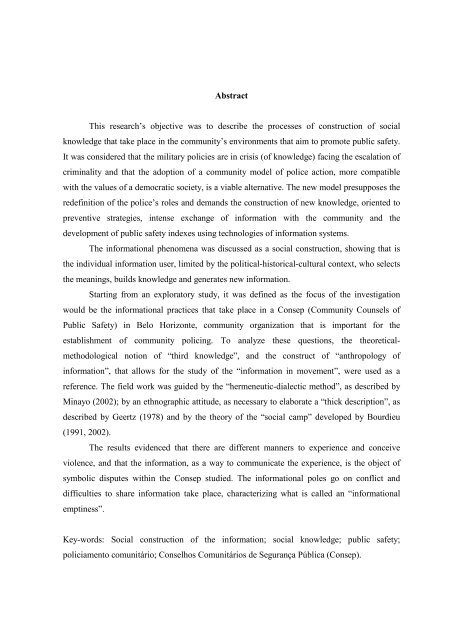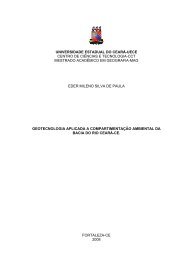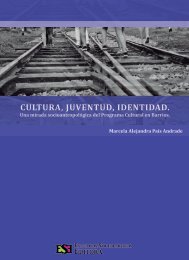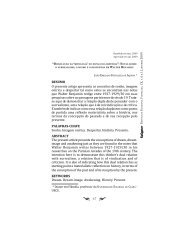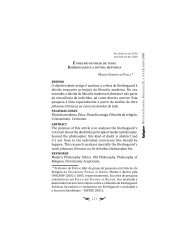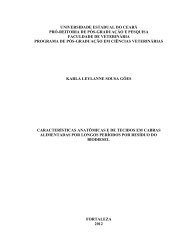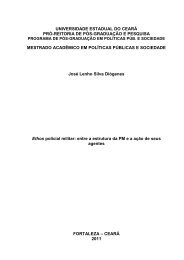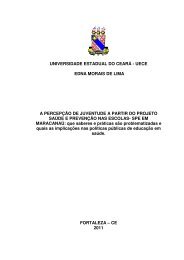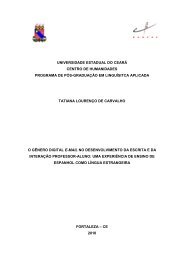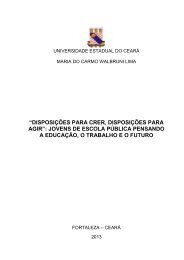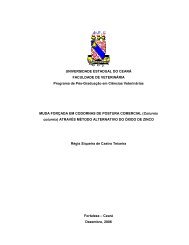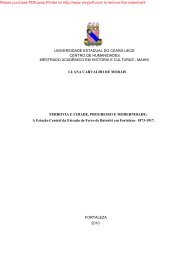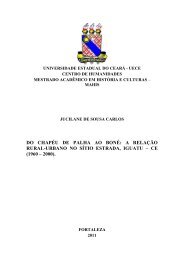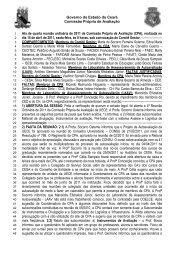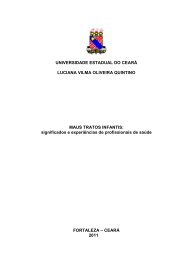- Page 1 and 2: Universidade Federal de Minas Gerai
- Page 3 and 4: FICHA CATALOGRÁFICA Elaborada pela
- Page 5 and 6: Aos dignos membros do Consep 17, da
- Page 7: Resumo Esta pesquisa teve como obje
- Page 11 and 12: GT - Grupo tático IEG - Informaç
- Page 13 and 14: 2.5 Shera: epistemologia ou cogniç
- Page 15 and 16: CAPÍTULO 6 APRESENTAÇÃO E ANÁLI
- Page 17 and 18: 16 tecnologias, sobre a criminalida
- Page 19 and 20: 18 A relevância do trabalho, em te
- Page 21 and 22: 20 No segundo capítulo, utilizando
- Page 23 and 24: 22 apresentados aspectos metodológ
- Page 25 and 26: 24 planejada do ponto de vista estr
- Page 27 and 28: 26 apresentando-se como alternativa
- Page 29 and 30: 28 A questão da manutenção da or
- Page 31 and 32: 30 depoimento de um policial que, e
- Page 33 and 34: 32 eventuais problemas e insatisfa
- Page 35 and 36: 34 que sejam, operadas na sociedade
- Page 37 and 38: 36 Vê-se que o saber policial não
- Page 39 and 40: 38 mais vulnerável, inclusive, à
- Page 41 and 42: 40 Alguns exemplos, característico
- Page 43 and 44: 42 em relação à polícia e seu p
- Page 45 and 46: 44 nos quais as vítimas não têm
- Page 47 and 48: 46 Por extensão, pode-se falar, ta
- Page 49 and 50: 48 1.9 Janelas quebradas Em busca d
- Page 51 and 52: 50 da ordem e da normalidade nas co
- Page 53 and 54: 52 polícia pode fazer se não cheg
- Page 55 and 56: 54 oportunidades de emprego secund
- Page 57 and 58: 56 Capítulo 2 A informação como
- Page 59 and 60:
58 Para Capurro (2003), a teoria ma
- Page 61 and 62:
60 A facilidade de acesso à inform
- Page 63 and 64:
62 do esforço para dominar e/ou es
- Page 65 and 66:
64 mesma coisa é dita de diferente
- Page 67 and 68:
66 O mais importante, no entanto,
- Page 69 and 70:
68 A ligação básica através da
- Page 71 and 72:
70 Refere-se a um equipamento prév
- Page 73 and 74:
72 É nesse contexto que surge, por
- Page 75 and 76:
74 físicos e cognitivistas. Alarga
- Page 77 and 78:
76 são capazes de interferir na pr
- Page 79 and 80:
78 perspectivas quanto ao futuro. H
- Page 81 and 82:
80 2.10 Araújo: o processo histór
- Page 83 and 84:
82 2.11 Marteleto: as razões de um
- Page 85 and 86:
84 diferenciando-o de um bem cultur
- Page 87 and 88:
86 2.11.1 Pressupostos da antropolo
- Page 89 and 90:
88 Chama, então, a atenção para
- Page 91 and 92:
90 empírico, onde os receptores/us
- Page 93 and 94:
92 As formas de conhecimento em ger
- Page 95 and 96:
94 que possui uma lógica (própria
- Page 97 and 98:
96 da informação, esse sujeito po
- Page 99 and 100:
98 Capítulo 3 Uma pesquisa explora
- Page 101 and 102:
100 muitos casos, tendem a aumentar
- Page 103 and 104:
102 e órgãos de segurança de uma
- Page 105 and 106:
104 acerca do significado dos Conse
- Page 107 and 108:
106 principalmente como instrumento
- Page 109 and 110:
108 tanto no espaço quanto no temp
- Page 111 and 112:
110 3.2.5 As finalidades dos Consep
- Page 113 and 114:
112 Sobre essa questão é interess
- Page 115 and 116:
114 3.2.7 Resistências às IEG na
- Page 117 and 118:
116 A partir desse relato verifica-
- Page 119 and 120:
118 problemas têm sido identificad
- Page 121 and 122:
120 Bourdieu (2002) considera que a
- Page 123 and 124:
122 de números. Os trabalhos quali
- Page 125 and 126:
124 numa relativa autonomia das ci
- Page 127 and 128:
126 entre as CHS e as ciências nat
- Page 129 and 130:
128 Thompson (1995) assinala, entre
- Page 131 and 132:
130 cada autor). Deve-se ressaltar,
- Page 133 and 134:
132 linguagem, se esquece, segundo
- Page 135 and 136:
134 vivenciará um processo no qual
- Page 137 and 138:
136 objeto, procurando enfocar a cu
- Page 139 and 140:
138 comenta que, nem sempre, os etn
- Page 141 and 142:
140 Teodoro (2003) comenta que isso
- Page 143 and 144:
142 A partir dessa concepção sobr
- Page 145 and 146:
144 a efetiva participação no jog
- Page 147 and 148:
146 4.4.1 O conceito de habitus Com
- Page 149 and 150:
148 relação de conhecimento ou de
- Page 151 and 152:
150 O segundo, de cunho metodológi
- Page 153 and 154:
152 consolidação e sustentação
- Page 155 and 156:
154 Busca-se, além disso, elemento
- Page 157 and 158:
156 todos, sendo exercida para a pr
- Page 159 and 160:
158 5.1.2 Os Consep nos documentos
- Page 161 and 162:
160 5.1.3 Os Consep e a implantaç
- Page 163 and 164:
162 Dentro da análise do discurso
- Page 165 and 166:
164 Segundo Barros (2003), para que
- Page 167 and 168:
166 Quadro 3 - Relação de partici
- Page 169 and 170:
168 Assim definida a situação de
- Page 171 and 172:
170 acabada. Em outras palavras, is
- Page 173 and 174:
172 Capítulo 6 Apresentação e an
- Page 175 and 176:
174 consta no documento fornecido p
- Page 177 and 178:
176 Quadro 5 - Roteiro de leitura d
- Page 179 and 180:
178 são covardes e covarde tem que
- Page 181 and 182:
180 O Pcom 04 observou, em tom de a
- Page 183 and 184:
182 nervosos, temiam que o evento m
- Page 185 and 186:
184 portanto, ser expressão dessa
- Page 187 and 188:
186 no Consep, articulando esforço
- Page 189 and 190:
188 recentemente. Informou que havi
- Page 191 and 192:
190 É nesse contexto que o Pcom 05
- Page 193 and 194:
192 6.1.3.3 Terceiro momento: deman
- Page 195 and 196:
194 Existe uma demanda por formalid
- Page 197 and 198:
196 6.1.3.5 Quinto momento ou epíl
- Page 199 and 200:
198 silêncio das pessoas que, para
- Page 201 and 202:
200 Nesse caso, a referência ao te
- Page 203 and 204:
202 O presidente tomou a palavra e
- Page 205 and 206:
204 feita uma estatística dos crim
- Page 207 and 208:
206 prosseguiu dizendo que “o CPC
- Page 209 and 210:
208 O presidente, não acreditando
- Page 211 and 212:
210 cavalaria, parte de convênio e
- Page 213 and 214:
212 isso, o Pcom 05 observou que, n
- Page 215 and 216:
214 armados. Perguntou sobre a poss
- Page 217 and 218:
216 noticiosas, floresce e ganha es
- Page 219 and 220:
218 policial no controle da crimina
- Page 221 and 222:
220 Além disso, durante a pesquisa
- Page 223 and 224:
222 considerada mais afinada com a
- Page 225 and 226:
224 dentro”. Ou seja, ele questio
- Page 227 and 228:
226 Contou que, para melhorar a sit
- Page 229 and 230:
228 e de produção de informaçõe
- Page 231 and 232:
230 Daí o “vazio informacional
- Page 233 and 234:
232 erigidas, pois o próprio poder
- Page 235 and 236:
234 BITTNER, Egon. The functions of
- Page 237 and 238:
236 FREITAS, Lauro Soares de. Um es
- Page 239 and 240:
238 MARTELETO, Regina Maria; RIBEIR
- Page 241 and 242:
240 SOUZA FILHO, Silvio José de. C
- Page 243 and 244:
242 Anexo 1 Quadro 6 - Visão esque
- Page 245 and 246:
244 3) Que tipo de informações, m
- Page 247 and 248:
246 Anexo 4 ROTEIRO DE ENTREVISTA C
- Page 249:
248 Anexo 5 Quadro 7 - Discurso cri


